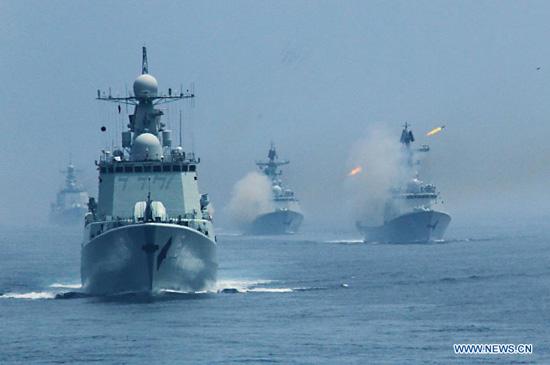A total of 160'000 soldiers, 1'000 tanks, 130 aircraft and 70 navy ships where involved. The military command declared that "our Far Eastern neighbors were informed of these maneuvers". What the command did not say, but everybody in the region no doubt understood, is that this was a clear message sent to Japan: Russia can rapidly and effectively reinforce its forces currently deployed on Sakhalin, so do not threaten us there.
This is a Russian TV report about these exercises (in Russian only):
-
This begs the question whether Japan did threaten Russia or not. The answer is "not directly".
Over the past decade Japan did reinforce its armed forces which are less and less "defensive" and which regularly acquire better projection capabilities. The Japan as a country never threatened Russia, but there are enough Japanese politicians who did exactly that, not only in regards to the so-called "Northern Territories" issue, but also with hostile statement concerning the Russian presence on Sakhalin. The real problem which these latest maneuvers tackle is not really a Japanese one, but a Russian one: for years the Russian military forces in the Far East have been neglected and their level or readiness reduced to an almost comical level. Yes, some elite forces (nuclear, airborne, navy) were in pretty decent shape, but the bulk of the ground forces has been completely neglected. With time, this resulted in a great sense of weakness and even vulnerability not only amongst the well-informed specialists, but also in the general public, in particular in Siberia.
The purpose of these latest large-scale exercises is to demonstrate the viability of the new Russian military doctrine in which each of the four Strategic Commands is in complete control of all the forces in its area of responsibility and each Strategic Command can autonomously deal with any contingency. In other words, the Eastern Strategic Command should be able to repel a Japanese attack on Sakhalin or even the entire Russian Far East autonomously, without external reinforcements or assistance. The key test of this latest exercise is whether forces usually dispersed all over the huge Eastern Strategic Command area of responsibility could be rapidly moved and concentrated on Sakhalin. So far, it appears that the exercise was generally successful, but with some rather embarrassing screw-ups including a 10 hour delay to refuel some aircraft in Khabarovsk.
I would add that if the "defending" forces were all drawn from the Eastern Strategic Command, the "attacking forces" are being moved in from the other Russian Strategic Commands, some as far as from 8'000km away.
 |
| Defense Minister Shoigu |
Does all this really matter to the rest of the planet?
I would say that it does, and a great deal. Simply put, Russia cannot fulfill its role of major power unless its military is in good shape. The Russian economy is still relatively small, and many years of "democratic" rule under Eltsin have terribly weakened Russia as an ally (how can an American colony be considered as a useful ally). The fact is that Russia can only offer one thing at this moment in time: the political will to resist the Anglo Empire and the commitment to do so within the limits of international law, as it did in the case of the US/NATO war on Syria. However, this Russian political commitment only has value as long as the Russian military remains capable of repelling any possible aggression against it because if it cannot fulfill this mission it simply becomes yet another a target for the Anglos.
 |
| "Joint Sea 2013" |
The bottom line is this: Russia is continuing the systematic re-construction of its armed forces in a steady process is involving more and more types of forces and units which are being tested in realistic exercises conducted throughout all the regions of Russia. The final goal is equally clear: to stop relying a few "elite" units and to finally bring the bulk of the armed forces to a readiness level equal to either "satisfactory" or "good". This will be done by making sure that no less than 70% of all the equipment is modern and by conducting more and more exercises of increasing complexity and size.
 |
| General Valerii Gerasimov |
The Saker






